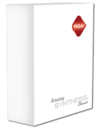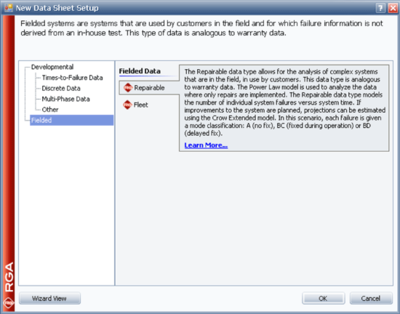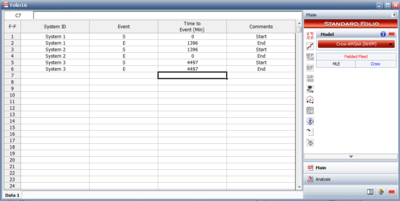RGA Data Types
Data Types
Introduction
Reliability growth analysis can be conducted using different data types. The following data types can be utilized in the RGA software, as shown in the Data Type Expert in Figures DataTypeExpert and DataTypeExpert1:
- Developmental Testing (Reliability Growth Data)
- Time-to-Failure Data
- Failure Times
- Grouped Failure Times
- Multiple Systems (Known Operating Times)
- Multiple Systems (Concurrent Operating Times)
- Multiple Systems with Dates
- Multiple Systems with Event Codes
- Discrete Data
- Sequential
- Sequential with Mode
- Grouped per Configuration
- Mixed Data
- Multi-Phase Data
- Failure Times
- Grouped Failure Times
- Mixed Data
- Reliability Data
- Time-to-Failure Data
- Fielded Systems
- Repairable
- Fleet
This chapter explores and examines these possible data schemes and outlines the available models for each data type.
Data Types
Introduction
Reliability growth analysis can be conducted using different data types. The following data types can be utilized in the RGA software, as shown in the Data Type Expert in Figures DataTypeExpert and DataTypeExpert1:
- Developmental Testing (Reliability Growth Data)
- Time-to-Failure Data
- Failure Times
- Grouped Failure Times
- Multiple Systems (Known Operating Times)
- Multiple Systems (Concurrent Operating Times)
- Multiple Systems with Dates
- Multiple Systems with Event Codes
- Discrete Data
- Sequential
- Sequential with Mode
- Grouped per Configuration
- Mixed Data
- Multi-Phase Data
- Failure Times
- Grouped Failure Times
- Mixed Data
- Reliability Data
- Time-to-Failure Data
- Fielded Systems
- Repairable
- Fleet
This chapter explores and examines these possible data schemes and outlines the available models for each data type.
Template loop detected: Template:Developmental testing data types
Fielded Systems
Fielded systems are systems that are used by customers in the field and for which failure information is not derived from an in-house test. This type of data is analogous to warranty data. The data types available for fielded systems data entry are:
• Repairable Systems
• Fleet
Template loop detected: Template:Repairable systems
Fleet
This data type is used to analyze the entire population (fleet). The data entry for this data type is similar to the data entry for repairable systems; however, the overall data analysis is again different. In repairable systems, the reliability of a single system can be tracked and quantified, whereas in a fleet analysis, data from the entire fleet as a whole is analyzed. Figure Fleetpic presents an example of data entered for fleet analysis.
Models for Fleet Data
The following models can be used to analyze fleet data. Models and examples using different data types are discussed in later chapters.
1) Crow-AMSAA (NHPP) (Chapter 5)
2) Crow Extended (Chapter 9)
[math]\displaystyle{ }[/math]
Fielded Systems
Fielded systems are systems that are used by customers in the field and for which failure information is not derived from an in-house test. This type of data is analogous to warranty data. The data types available for fielded systems data entry are:
• Repairable Systems
• Fleet
Data Types
Introduction
Reliability growth analysis can be conducted using different data types. The following data types can be utilized in the RGA software, as shown in the Data Type Expert in Figures DataTypeExpert and DataTypeExpert1:
- Developmental Testing (Reliability Growth Data)
- Time-to-Failure Data
- Failure Times
- Grouped Failure Times
- Multiple Systems (Known Operating Times)
- Multiple Systems (Concurrent Operating Times)
- Multiple Systems with Dates
- Multiple Systems with Event Codes
- Discrete Data
- Sequential
- Sequential with Mode
- Grouped per Configuration
- Mixed Data
- Multi-Phase Data
- Failure Times
- Grouped Failure Times
- Mixed Data
- Reliability Data
- Time-to-Failure Data
- Fielded Systems
- Repairable
- Fleet
This chapter explores and examines these possible data schemes and outlines the available models for each data type.
Template loop detected: Template:Developmental testing data types
Fielded Systems
Fielded systems are systems that are used by customers in the field and for which failure information is not derived from an in-house test. This type of data is analogous to warranty data. The data types available for fielded systems data entry are:
• Repairable Systems
• Fleet
Template loop detected: Template:Repairable systems
Fleet
This data type is used to analyze the entire population (fleet). The data entry for this data type is similar to the data entry for repairable systems; however, the overall data analysis is again different. In repairable systems, the reliability of a single system can be tracked and quantified, whereas in a fleet analysis, data from the entire fleet as a whole is analyzed. Figure Fleetpic presents an example of data entered for fleet analysis.
Models for Fleet Data
The following models can be used to analyze fleet data. Models and examples using different data types are discussed in later chapters.
1) Crow-AMSAA (NHPP) (Chapter 5)
2) Crow Extended (Chapter 9)
[math]\displaystyle{ }[/math]
Fleet
This data type is used to analyze the entire population (fleet). The data entry for this data type is similar to the data entry for repairable systems; however, the overall data analysis is again different. In repairable systems, the reliability of a single system can be tracked and quantified, whereas in a fleet analysis, data from the entire fleet as a whole is analyzed. Figure Fleetpic presents an example of data entered for fleet analysis.
Models for Fleet Data
The following models can be used to analyze fleet data. Models and examples using different data types are discussed in later chapters.
1) Crow-AMSAA (NHPP) (Chapter 5)
2) Crow Extended (Chapter 9)
[math]\displaystyle{ }[/math]



